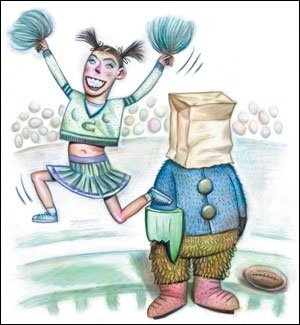American Indian mascots have been under fire for years and may someday disappear altogether from such states as California and Oklahoma, both of which have recently debated bills restricting or outlawing them. So insulting are the caricatures of “braves,” “redskins,” and others, some people say that a team moniker based on any other group of people would be cut immediately from the roster. But a look at a few unusual high school mascots and team nicknames from across the country suggests that banning just one type of disrespectful sobriquet won’t stop the complaints and that there’s plenty of umbrage to go around.
NO SMALL MATTER
The Mascot:The Midgets

The Mug Shot: The icon of athletic teams at Freeburg Community High School in Illinois is an angry-looking, mustachioed, potbellied little man with visible chest and armpit hair. One eye is swollen, and he wears boxing gloves, suggesting he’s been in a fight and is looking for another.
The Offense: “The word ‘midget’ is used in a derogatory sense,” says Dan Okenfuss, a spokesman for Little People of America, a nonprofit that advocates for “people of short stature and their families.” He traces the word back to the turn of the previous century, when very small people were displayed as curiosities in circuses and freak shows. Freeburg, he opines archly, “might want to consider the negative connotations it has to members of our community.”
The Defense: Principal Ben Howes downplays the seriousness of the Freeburg Midget. “He almost looks like a little cartoon character,” Howes says of the mascot, which, he adds, is much beloved, despite its deprecatory origins. According to school lore, the 1934 boys basketball team was so short that a sports announcer compared them to a bunch of midgets, and the name stuck.
EAST IS EAST
The Nickname: The Orientals
The Root Problem: Students playing for East High School in Akron, Ohio, wear uniforms emblazoned with a picture of Chang, a red dragon. What has some Asian Americans breathing fire, however, is the team’s nickname: When East High takes the field or the court, students in the stands root for the Orientals.
The Offense: Brant Lee, a board member of Akron-based Asian Services in Action and an associate professor at the University of Akron School of Law, calls the name “an old-fashioned, outmoded term.” He compares it to calling a team “the Negroes” or “the Chinks,” which, he says, was until recently the mascot of an Illinois high school. “The objections [to changing the name] were the same,” Lee notes. “People were saying, ‘We didn’t mean anything offensive by it.’ ”
The Defense: “The kids like it; it’s been their mascot for over 50 years,” says principal Janna Bruner. The name comes from the school’s location relative to the rest of Akron, she adds. “Occasionally people have talked about changing the mascot, and it is met with strong resistance on the part of the students and the alumni. ... Chang is just a part of our East High heritage.”
INVISIBLE MAN
The Mascot: The Colonels
The Mug Shot: According to school board chairman David Dunn’s description, the mascot of Brattleboro Union High School in Vermont was until recently a caricature of a man with a handlebar mustache and goatee. The Colonel also wore a wide-brimmed hat, a cravat, and a long-tailed coat, and he leaned on a cane.
The Offense: The town’s ALANA Community Organization, which encourages sensitivity toward African, Latin, Asian, and Native American groups, took exception to the Colonel’s resemblance to an antebellum South plantation owner. “It’s incredibly out of context for the state of Vermont,” says Curtiss Reed Jr., the organization’s executive director, who points out that Vermont was the first state to outlaw slavery. Compounding the image problem, students often waved the Confederate flag at games.
The Reaction: An opinion piece written for a local newspaper by Reed, who’s African American, noted that the high school sits on the spot where Union soldiers mustered during the Civil War before marching south. The article touched off a public debate in the press and at meetings of the school board, which in 2003 decided, against the majority student opinion, to keep the Colonel’s name but banish his likeness.
The Fallout: Freshmen now take a compulsory class called “A World of Difference” that’s intended, Dunn says, to show students that “there are other views—other differences in people and things in the world.” The number of racially motivated campus incidents has declined during the past two years, he adds. Meanwhile, the school is still without a mascot.
UNHOLY WAR
The Mascot: The Crusaders
The Mug Shot: Eddie the Crusader, who represents Edgewood High—a Catholic school in Madison, Wisconsin—is depicted as a knight in a full suit of armor with his arms held up in a boxer’s pose.
The Offense: A knight clad for battle on behalf of a Catholic institution brings up bad historical memories for those whose ancestors were on the receiving end of the medieval Crusades. “Armies from Europe took land from Muslims, converting them to Christianity by force,” notes Rabiah Ahmed, a spokeswoman for the Council on American-Islamic Relations. “Mascots are supposed to unite.”
The Defense: Students, says K. Michele Clarke, who recently stepped down as the school’s president, “don’t want to see our little crusader guy go, ... but I think that’s more of an emotional reaction to liking the cartoon character than to anything else.” She insists that the name is “not about going after people of other faiths.”
The Fallout: Eddie’s fate is still undecided. A committee of school officials has been debating for years, Clarke says, about whether an armed Crusader getting ready to punch someone “carries out the school’s values of truth, compassion, justice, community, and partnership.”




